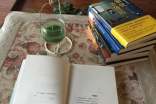篇一:《描写家乡的英语作文》
描写家乡的英语作文
Wherever I am, I find it hard to resist the tempting call of my hometown. Situated at the north-western tip of Xin-zhu County, bordering Tao-yuan County with a small winding stream is my old hometown, the humble and bleak fishing and farming village. The residents there used to make their living by fishing in their boats on the nearest waters of the Taiwan Strait. Later, those boats were heavily outrun by modern ships. Since then, life has never been easy for the villagers, as they have to live off the tiny pieces of land. I often feel that they are peasants rather than farmers. The village is famed for its windy weather, bad for farming but good for the strengthening of character. I can still recall how those salty winds howled all the way through my childhood. But as I now look back upon those tough days and drab rural lives, I feel blessed; I seem to have gone through the ordeal and am capable of facing any hardships. As I am growing older, in my heart, my hometown has become the symbol of the deepest nostalgia and stood for an everlasting affection. I, in turn, can always seek solace through visualizing my lovely hometown.
无论我身在何处,总觉得很难抗拒故乡诱人的呼唤。朴实而显荒凉的故乡,位於新竹县西北隅,仅以一蜿蜒小溪与桃园县接壤,是一农渔兼具的村庄。居民过去在台湾海峡近海水域,以小船捕鱼维生,稍后,小船远不敌现代化船舶。从此,大多数村民的生活,就不曾安逸,因为他们必须依赖小小农地过活。我常觉得他们是小农,而非一般的农夫。村子以多风闻名,刮风的天气,对农耕不利,却有益於强化性格,我仍旧清晰地记得,童年时期咸咸的风总是吹个不停。可是当我现在回顾那段艰苦的日子和沈闷的乡野生活,反倒觉得很有福气;似乎觉得已经通过了严厉的试炼,而现在任何苦难都能面对。年纪渐长,心里觉得故乡已经象徵最深沈的乡愁,也代表永恒的依恋,而我只能藉著慕想故乡的影像以寻求慰藉。
回答
篇二:《我的家乡英语作文》
英语作文 我的家乡
My home town is a beautiful place. It stands beside a wide river and is rich in fish and rice.
But in the old days it was a poor and backward little town. Many people had no work. They lived a hard life.
In 1949 my hometown was liberated. Since then great changes have taken place there. The streets have been widened. Factories, schools, hospitals, cinemas and theatres have sprung up one after another. The life of the people is greatly improved.
I love my hometown. All the more I love its people. They are working hard so as to make it still richer and more beautiful.
英语作文 我的家乡
I am from ShenZhen. In spring ,the weather is warm and wet. I can play kite. In summer, the weather is hot and wet. I can swim in the swimming pool. In the autumn, the weather is cool and dry. I can play kite, too. In the winter, the weather is cold and dry. It never snow.
英语作文 我的家乡
写一个《我的家乡》英语作文60词
Welcome to my hometown! Shanghai is my hometown. It is a modern and busy
town. It has a long history. There are many big supermarkets, beautiful gardens and good factories here. It is very easy to go shopping. You can see big trees and nice flowers. There are many restaurants in Shanghai. The food tastes very delicious.You can enjoy eyery minutes of it. Many visitors come here to enjoy it.
篇三:《英语作文 家乡的变化 中英翻译》
Changes in My Hometown
My hometown Gaochun is an old and beautiful city. It used to be quiet place. There were green hills, fresh air and many old houses. However, the area has changed a lot over the years. Now there are many new squares, new roads and a lot of tall buildings.
我的家乡高淳是一个古老而美丽的城市。以前它是一个很安静的地方。有绿色的山,新鲜的空气和许多老房子。然而,这几年这里发生了很大的变化。如今有很多新广场,新道路和高楼大厦。
In the past, people could only go to there by bicycle or on foot. Many buses pass there now, people can take the taxi, car, bus, underground or light rail to Gaochun, and it is faster and easier to get there. The environment has also changed, too. The water is clearer, the tree is greener, and the air is fresher. We are happy to live in the beautiful city.
过去人们只能去骑自行车或者走路去那里。现在有很多公共汽车都到那,人们可以乘坐出租车,小车,公共汽车,地铁或轻轨到高淳。和以前相比现在去那儿更快更容易了。环境也发生了变化。水更清了,树更绿了,空气更清新了。住在这座美丽的城市我们都很高兴。
篇四:《关于家乡的英语作文》
Knowledge, wisdom and Creativity{关于家乡的英语短文}.
A Term Paper
Submitted to the Department of Foreign Languages and Literature
In Partial Fulfillment of the
Study of ENG2103A
English Prose I
刘玉婷
Grade 2013
January, 01, 2014{关于家乡的英语短文}.
According to the dictionary, knowledge is information and understanding about a subject which a person has or which all people have. Comparatively speaking, wisdom refers to the ability to take advantage of your experience and knowledge in order that you are able to make sensible decisions or reasonable judgments. As we have already seen, knowledge is not equivalent to wisdom while it is on the basis of wisdom.
There is no lack of universal genius. In many cases, their lectures contain a large stock of abstract information, which may be boring and elusive for us to learn or master. The audiences would unconsciously worship them as a result of their being wealthy in knowledge. We have got to confess that they are much more knowledgeable. Nevertheless, some of these people gradually become helpless and panic when plunging in to the condition that they need to deal with something that they have not learned in the book. On the contrary, the rest do quite well in, or to say, have a gift in connecting their knowledge with the fact, then creating a completely new knowledge and solving the difficult issues smoothly. And this is what is called wisdom.
Unfortunately, compared with the education in the European countries, it is a pity that Chinese education seems to emphasize more on the teaching of knowledge, neglecting the cultivation of the creative ability. Most educators still cannot figure out why wisdom is more important than knowledge. What is worse, during the educational activities, their craze about the knowledge clouds students’ hunger of wisdom and kills their creativity. Even if you can get high grades or recite a book
backwards fluently, it just means that you have a good master of the textbooks. You probably succeed to repeat the knowledge tens of thousands of times to others. Nevertheless, it is not wisdom while you never actively think and voluntarily explore something deeper.
Certainly, I am not trying to put a damper on things or to negate the presence of knowledge, but trying to alert that knowledge is a pretty significant basis of creativity and wisdom instead of an obstacle to creating wisdom. As is known to all, knowledge is limited while wisdom and creativity are limitless. Only when the knowledge is transferred into wisdom can it shows its value.
篇五:《关于家乡英语作文》
The Wine Culture of NuJiang
When you visit NuJiang in addition to enjoy the beautiful landscape, there are three things you should try, or the extreme views will lack some climax. The first thing is to drink concentric wine, the second thing is to try liusuo, the third thing is to play in the water. Today I will mainly introduce NuJiang’s culture of concentric wine .
Lisu’s culture of wine can be described as broad and profound, colorful, unique, it is not only the crystallization of the Lisu material culture and spiritual culture, but also as the representative of Lisu enthusiasm that is bold and unrestrained. Lisu is the host of Sanjiang, which Lisu nationality are mainly distribution in the Jinsha River, Lan -cang River, Nu River where is my hometown.
Lisu is a hardworking , brave and bold nation. Wine has a very unique feelings in their cultural life, which is the symbol of their expression of joy and friendship. Lisu’s wine have rich culture, and best known as to the number of "concentric wine", concentric wine is representative of the Lisu wine culture.
When Lisu preside guests, the host or hostess generally toast guests three bowls of concentric wine and will toast no longer. But if guests to retaliate the owner, it will make guests until drunk. Lisu drink concentric wine very civilized, men and women bend each arm round each shoulder and antiphonal singing, which is men and
women drink and nobody produce evil, lyrics or long or short. The lyrics content from the history of the Chinese nation to grandparents, friendship, lucky life, work orders, etc.
Lisu people entertain with it is brewed rice wine that alcohol degree is not high and taste sweet , but the stamina is very high, if drinking in the cool wind, red will float in the face at once. In recent years, the concentric wine has spawned a new form of toast "Three Rivers", which is similar to the concentric wine, The difference is three people drink a bowl of wine. Theother way toast, called "high mountain and flowing water" that is the most horrible way of toast. It is said, when the guests drink, the host side the flagon and add wine until wine is exhausted by the guests. During this process without stopping and can’t spilled the wine out of mouth, or do it again. 到怒江除了饱览绝美山水,有三件事是你一定要尝试的,不然极致的美景中会少了那么一点点高潮。第一件事 喝同心酒,第二件事 过溜索,第三件事 亲水。今天我主要介绍一下怒江同心酒文化。{关于家乡的英语短文}.
傈僳族的酒文化可谓是博大精深、绚丽多彩且独具特色,它是傈僳族物质文化和精神文化的结晶,也是傈僳族热情奔放、真诚待客的写照。傈僳族是“三江的主人”(傈僳族分布区域主要集中在金沙江、澜沧江、怒江三江流域).
傈僳族是一个勤劳勇敢而豪放的民族,在文化生活中,他们对酒有着非常独特的感情,酒是他们表达欢乐和友谊的象征。傈僳族酒文化内涵丰富,最有名的当要数“同心酒”,同心酒是傈僳族酒文化的代表。
当有客人时,男主人或女主人一般会敬客人三杯同心酒就不再敬。但如果客人回敬的话主人就一定会让你大醉才休。傈僳族喝同心酒极为文明,就是男女同喝也不会让人产生邪念,男女相互搂在肩上后对唱,歌词或长或短,内容从民族历史到祖辈、朋友友情、幸运生活、工作嘱咐等等,应有尽有,蔚为大观。
傈僳人待客用酒是自酿的米酒,酒精度不高,入口香甜,但后劲特别足,酒后怕见风,凉风一吹准晕。近年来,由“同心酒”又衍生出一种新的敬酒形式:“三江并流”,跟饮“同心酒”类似,只是多了一名敬酒的,三人同饮一杯酒。还有一种敬酒方式,叫“高山流水”,也是最恐怖的。传说,客人边喝,主人边用酒壶添酒,直到把壶中酒喝光,中途不能停顿,也不能把酒洒到外边,否则要把过程再复制一遍。
篇六:《我的家乡英语作文》{关于家乡的英语短文}.
## is not only the city where I was born, but also the only place I've never been able to leave. 5 years ago, I moved from here to another city to begin my college life. The day I left ## I felt as a fish out of water.
## is the only place where I've walked past a schoolyard and pictured a future son or daughter of mine playing balls.
I love this city. She’s small and quiet. Every day I live here, I could have the safety feeling which I got when my mother held me in her arms.
I love this city. She is very beautiful and lovely. Everywhere you can see the flowers, grass and trees. The shops are full of all kinds of goods. When you walk in the street, you can feel the gentle wind touching your face and breathe the fresh air.
I love this city. The climate here is very warm which is very suitable for people to do some outdoors activities.
I love this city. She is where I have lived for ____ years with my parents, my good friends, and my teachers who have supported me. She has almost all my memories.
I love the night of ##. People sit in the gardens of their houses or in the small restaurants, chatting, drinking and enjoying the delicious seafood which is abundant in our city.
I love the sunrise of ##. When I was still a little girl, my parents and I used to climb up the hill in the morning to see the sunrise. When the beautiful sun went up, the gentle breeze brought us the fragrance of the flowers, the golden sunshine made our hair shimmer, and my heart would be filled with hope and happiness!
Maybe someday I will have to leave this city, but no matter where I would go I will never forget this city, its people, its trees and its sunrise. Yes, everything that it gave me could be given by other places, but my love won’t be changed, because it is my home town.
##不但是我出生的城市,也是我无法离开的唯一地方。5年以前,我离开这里到另外一个城市开始我的大学生活。离开##的那天,我感觉自己像是一条离开了水的鱼儿。
当我走过一座校园,想象我未来的儿子或女儿能在这里玩耍。##,就是唯一一个让我有这种想法的地方。
我爱这座城市。她小而安静。每天我在这里居住, 我都有一种安全感。这种感觉只有当我母亲用双手环抱着我的时候我才能感觉得到。
我爱这座城市。她美丽而可爱。在##,你各处都能看到花、草和树木。商店里陈列着各种商品。当你走在街道上,你能感觉温和的风触摸着你的脸,并且呼吸到新鲜的空气。
我爱这座城市。这里的气候温暖,并且非常适宜做一些户外活动。
我爱这座城市。在这里,我居住了____年。这里有我的父母、我的好朋友和支持我多年的老师。她拥有我几乎所有的回忆。
我爱##的夜晚。人们在他们房子的花园或小餐馆中闲坐,聊着天、品尝我们城市所盛产的海鲜。
我爱##的日出。当我仍然是一个小女孩的时候, 我的父母和我常常早起爬山去看日出。当美丽的太阳升起的时候,轻柔的微风带给我们花的芬芳,金色的阳光使我们的头发也漾起一层亮色,那一刻,我的心总是充满了希望和快乐!
也许有一天,我将不得不离开这座城市, 但是无论我走到哪里,我都不会忘记##、它的人们,它的树和它的日出。是的, 凡是它能给予我的别的城市也可以给与,但实我的爱将永不被改变。因为,这里才是我的家乡.
春节作文
写春节作文前,我们可以先回忆下过春节是我们参加过的活动,如贴倒福、分压岁钱、吃饺子、掸扬尘、贴年画、贴剪纸、放鞭炮、守岁、给压岁钱、挂千千结、贴春联等,然后挑一个我们印象深刻的上网查些资料,可以到百度搜春节的八个习俗,春节的由来与传说等,也可以上深海网作文素材频道找到相关资料再进行介绍。
作文题目可以自拟,如欢度春节,春节游文庙,除夕之夜,美丽的春节,春节花会
开头部分:大致介绍一下春节,及春节的一些习俗,点明你所要介绍的习俗。(略写)
第二部分:介绍这一习俗的来历、象征意义等,像剪纸、年画、千千结等还可以写写这些物品的种类、样子等。(详细)
第三部分:回忆自己参与这一活动的情景。(详细)
结尾结尾部分:写写自己对这一习俗的感受。
每个部分举例:
开头部分:大致介绍一下春节,及春节的一些习俗,点明你所要介绍的习俗。(略写)
例:元宵节是我国的四大节日之一,元宵节一过,春节也就算过完了,所以这一天是非常隆重和热闹的。过元宵节的节目丰富多彩,有充满乐趣的看花灯猜灯谜,有喜气洋洋的舞龙,还有热闹非凡的赛龙船。不过,最吸引我们小孩子的却是那多姿多彩的烟花。
第二部分:介绍这一习俗的来历、象征意义等,像剪纸、年画、千千结等还可以写写这些物品的种类、样子等。(详细)
例:春联代表着欢乐祥和。在我们中国,每逢春节,无论城市还是农村,家家户户都要精选一副大红春联贴在门上,为节日增加喜庆的气氛。一幅幅春联不仅带来了吉祥和祝福,还带来了中国古老的浓浓的文化气息。瞧!“大地春光好,长天晓日红”、“岁岁皆如意,年年尽平安”、“江山万里如画,神州四时皆春”、“春风送春处处***美,喜鹊报喜家家喜事多”…… 幅幅春联让千家万户喜气盈门。春联的种类比较多。按照使用场所,可分为门心、框对、横批、春条、斗方等。因此,贴的位置也不同,如“门心”贴在门板上端中心部位;“横批”贴在门楣的横木上。
第三部分:回忆自己参与这一活动的情景。(详细)
例:记得去年元宵节的晚上爸爸妈妈带我去工人体育馆看烟花。八点整,只听见几声沉闷的声音,一个个烟花带着红红的火星窜上了天空,几声脆响,夜空绽放出几朵美丽的花朵。它们的形状和颜色各不相同,有五颜六色的满天星,金黄色的蒲公英,紫色的牵牛花,火红的玫瑰花,粉红的月季、银色的百合,真是绚丽多彩。随着一声声的炮响,人们在惊呼,在赞叹,夜色中,人们微微扬起的脸上也变幻着多姿的色彩,露出了幸福的笑容……
结尾结尾部分:写写自己对这一习俗的感受。{关于家乡的英语短文}.
例:我看着那散发着传统文化芳香的中华结,仿佛品味到了中华民族远古的神秘和东方的灵秀。它的古香古色,它的千变万化,让我神往,让我遐想……
《春节的街头》
今天,是中国传统节日——春节。早晨我还没醒,就听到了鞭炮的声音。平静的社区,今日显得热闹非凡。这热闹的喧嚣,把我的睡意一股脑的全都打撒开来。于是,起床穿上了新衣服连早饭都来不及吃就冲到门外,看着各家各户的炮竹,烟花。接着就是跟爸爸妈妈一起去走街串巷——拜年!
“李伯伯,新年快乐”“王阿姨,工作顺了”“刘奶奶,身体健康”〃〃〃跟所有的长辈们拜过年之后,妈妈提议说:一会,去街上看看,感受下新年的气氛。 一上街,街上可就更热闹了。人们手里有提着大袋大袋的菜,身边的孩子手上握着一大把小花炮,蹦蹦跳跳地跑着。看!我左边的一位四、五岁左右的小女孩,跑到前面去。一下子又转过头对一位满手是鼓鼓的袋子的大人喊着:“爸爸,
快点!我要回去放炮玩呢!”。有拿着那边超市发的小气球的,红的,黄的,绿的,还有蓝的。也有三五成群,手挽着手说说笑笑的姑娘们,小伙子们,忙绿了一年,辛苦了一年,我想这个时候应该是大家最放松,最高兴的时候。你看,路灯上还挂着两个小红灯,喜气洋洋的。就像在说,“我们也要过新年,我们也要过新年”。
一进菜市场,那才更热闹呢!人流窜动,一眼望去,什么也看不见,全是人。还有那翠绿的黄瓜,可真新鲜哪,你看,那金黄色的小花在太阳的照射下显得多么的生机勃勃啊。那鲫鱼,鲢鱼,青鱼,草鱼等等在水里游来游去,真是印证了我们中国的老话:年年有鱼(余)!黄的韭菜,红的番茄,黑的木耳,白的萝卜〃〃〃真是要什么有什么呀。“哎哟!可真够挤的。”我嘀咕了一句。跟着妈妈买了几个我爱吃的菜,结完帐就走出了菜场。超市里的收银台前也早已排起了长龙。 傍晚时分,街上,又渐渐安静下来。店主们把店子关了,超市也比往常早了些许关门。大家都提着东西回家过年去了。
到了晚上6点左右,社区渐渐安静,孩子们都回家吃团圆饭去了。吃完团圆饭7、8点的样子社区又重新热闹起来。孩子们全都出来放花炮了。这个放个“降落伞,”那个又放个“天女撒花”〃〃〃〃各式各样的花炮全有。每放完一个都会聚集好几个孩子,他们在讨论谁的花炮最美丽,谁的花炮颜色最多,之后又是阵阵欢笑。大人们或几个坐在一起打牌,打麻将;或几个坐在一起嗑瓜子,剥花生;或看着自己的孩子放花炮,偶尔还要帮他们一下。大多数的孩子,都是自己独立操作完成。
夜,更深了。人们陆陆续续的回家了,有些不肯回家的孩子也在父母的劝说下,不情愿的回了家,一天的热闹景象渐渐被夜幕包围。我不禁感叹又是一年到,时间过得可真快呀!
春节见闻{关于家乡的英语短文}.
“当、当、当”新年的钟声敲响了,家家户户的门上早已贴上了或火红或金黄的对联,每一家的老老少少都乐得合不拢嘴。兴奋的孩子们有的目不转睛地盯着电视,品尝着一年一度的晚会大餐――春节晚会;有的急着给自己的长辈拜年,发短信,打电话,所有新年的祝福话语仿佛怎么也说不完;调皮的孩子正在向自己的父辈们 “讨要”压岁钱;屋外的鞭炮声此起彼伏,炸开了锅,五彩的烟花更是把这个特殊的夜晚点缀得绚丽多姿。
版权声明
本站文章收集于互联网,仅代表原作者观点,不代表本站立场,文章仅供学习观摩,请勿用于任何商业用途。
如有侵权请联系邮箱tuxing@rediffmail.com,我们将及时处理。本文地址:https://www.wuliandi.com/chuzhong/cezw/246037.html








